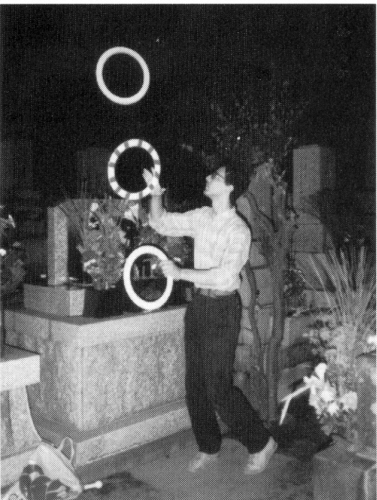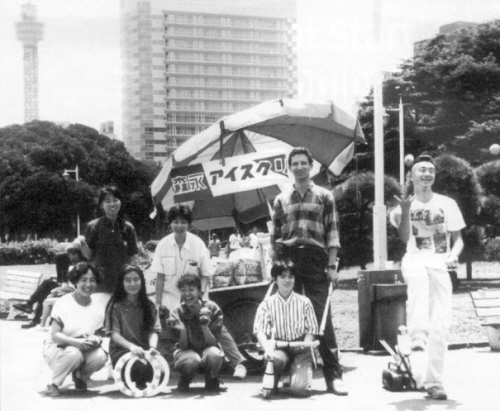Last
year students at Kitasato University in the city of Sagamihara.
about 40 kilometers southwest of Tokyo, were surprised and
confused to find a club for "jyagulingu" - a
transliteration of the nearest approximation of "juggling"
in the Japanese sound system.
But,
"jyagulingu" was incomprehensible to the students because
there are no words native to the Japanese language that convey the
Western idea oi juggling. And if that wasn't bad enough. the head of
the club was a foreigner with a name that sounded like a Spanish
greeting!
The
Kitasato Juggling Club was not a great success its first year. It
was no one's first choice. The most dedicated members were an animal
husbandry major and a pharmacology major who spent much more of
their energies in the Bodybuilding Club than in the Jyagulingu Club.
This
year has been different! First of all, I made sure that the posters
advertising the club at the beginning of the school year were
copiously decorated with action scenes of juggling and pictures of
props. Although the posters only gave them a vague idea oi juggling.
some were fascinated enough to come to the first meeting. So 15
intrepid souls (mostly veterinary science and pharmacology majors)
joined.
After
a little more than a month of semiweekly practice sessions, during
which every regularly attending member showed great progress. I
asked the group to put their balls, rings, clubs, hula hoops
or unicycles down for a few minutes and write a short essay in Japanese
on what kind of
image they had of juggling before they started and what they thought
of it now. Here are some of their comments (translated by me).
Yuko
Yamaguchi (female veterinary science major):
At
first, I had no idea what juggling was. I thought that it was
something like bowling.
After
I began juggling I was surprised when I found out that the
way to throw three balls was different from "otedama."
It was more difficult than it looked.
Takumi
Ishii (female vet science major):
l'm
able to juggle three balls, but I'll be happy when I'm
able to master
more difficult tricks. In the meantime I enjoy practicing.
Ilitoshi
Ono (female fisheries major):
Without
knowing exactly what I was getting into I blindly joined the club.
Although I've only been juggling for about a month, and I still
can't do much, I enjoy it.
My goal is to be able to ride a unicycle while doing juggling
tricks.
Now
that we've got our club started. we're making plans for the year
ahead. They include mastering a good repertoire of three ball
tricks. a few ring and club maneuvers, passing, some unicycle
and slack rope walking for those interested, and a trip to Yokohama
to see the juggler performing with the Bolshoi circus from the
Soviet Union.
As
the university adjoins a medical school and hospital, we also hope
to perform for patients in the children's ward and for residents of
some local nursing homes. And I'm still dreami ng of getting an act
together for the university festival - an extravaganza which has no
equivalent in American colleges. "Jyagulingu" has found
its place. at least at one Japanese university.
My
mistakes here have taught me a few things about how to organize a
juggling club from scratch, I
pass along some suggestions now to help people who find
themselves trying to get a group started in an area of the world
where juggling may not exactly be a household word.
*
To give the group a sense of cohesion, early on you should make
members do things together. At the very beginning two novices can
juggle three balls between
them, and after
a few weeks stealing
and passing can be introduced. Contrary to what I
had thought. even if a person is not very consistent with the
cascade, the excitement that comes from successfully executing just a
few passes or steals provides good motivation for him or her
to become "fluent" with the basics as soon as possible so
that more enjoyable, "social" juggling can begin.
*
Because different people have talents in different areas, let them
experiment from the start with all the equipment you have available
clubs, rings, devil sticks, diabolos, etc. You may be surprised
to find out that someone can do some things immediately that you had
to build up to in steps. As you see where their talents lie you can
set up mentor / mentee relationships between members that will ease
your burden of constantly being in the role of teacher and, at the
same time, make the members feel a sense of accomplishment and of
responsibility for each other.
*
In a place where few other jugglers - hobbyists or professionals -
can be found, it's hard to replace the inspiration of watching
people with superior skills or new ideas. Some ways to get around
this are to show videos, go to a circus, or seek out the nooks and
crannies where street performers ply their trade.
Good
luck to those who are planning, or who have already started, a
juggling club in foreign lands. The joy of seeing people happily
engaged in an activity that they previously hardly knew existed is
all the reward you need!
'tc
Joseph
Dias, a Life Member of the IJA, is a lecturer in the department of
liberal arts and sciences at Kitasato University and a part-time
lecturer in the department of literature at Keio University. He has
lived in Japan for seven years. He and his wife, Izumi, and son,
Noah Juntaro, are residents ofZama City, Kanagawa Prefecture.

